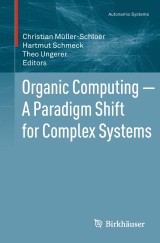Details

Organic Computing - A Paradigm Shift for Complex Systems
Autonomic Systems
|
149,79 € |
|
| Verlag: | Birkhäuser |
| Format: | |
| Veröffentl.: | 29.04.2011 |
| ISBN/EAN: | 9783034801300 |
| Sprache: | englisch |
| Anzahl Seiten: | 627 |
Dieses eBook enthält ein Wasserzeichen.
Beschreibungen
<p>Organic Computing has emerged as a challenging vision for future information processing systems. Its basis is the insight that we will increasingly be surrounded by and depend on large collections of autonomous systems, which are equipped with sensors and actuators, aware of their environment, communicating freely, and organising themselves in order to perform actions and services required by the users.</p><p> </p><p>These networks of intelligent systems surrounding us open fascinating ap-plication areas and at the same time bear the problem of their controllability. Hence, we have to construct such systems as robust, safe, flexible, and trustworthy as possible. In particular, a strong orientation towards human needs as opposed to a pure implementation of the tech-nologically possible seems absolutely central. The technical systems, which can achieve these goals will have to exhibit life-like or "organic" properties. "Organic Computing Systems" adapt dynamically to their current environmental conditions. In order to cope with unexpected or undesired events they are self-organising, self-configuring, self-optimising, self-healing, self-protecting, self-explaining, and context-aware, while offering complementary interfaces for higher-level directives with respect to the desired behaviour. First steps towards adaptive and self-organising computer systems are being undertaken. Adaptivity, reconfigurability, emergence of new properties, and self-organisation are hot top-ics in a variety of research groups worldwide.</p><p> </p><p>This book summarises the results of a 6-year priority research program (SPP) of the German Research Foundation (DFG) addressing these fundamental challenges in the design of Organic Computing systems. It presents and discusses the theoretical foundations of Organic Computing, basic methods and tools, learningtechniques used in this context, architectural patterns and many applications. The final outlook shows that in the mean-time Organic Computing ideas have spawned a variety of promising new projects.</p><p>
<p>Organic Computing has emerged as a challenging vision for future information processing systems. Its basis is the insight that we will increasingly be surrounded by and depend on large collections of autonomous systems, which are equipped with sensors and actuators, aware of their environment, communicating freely, and organising themselves in order to perform actions and services required by the users.</p><p> </p><p>These networks of intelligent systems surrounding us open fascinating application areas and at the same time bear the problem of their controllability. Hence, we have to construct such systems as robust, safe, flexible, and trustworthy as possible. In particular, a strong orientation towards human needs as opposed to a pure implementation of the technologically possible seems absolutely central. The technical systems, which can achieve these goals will have to exhibit life-like or "organic" properties. "Organic Computing Systems" adapt dynamically to their current environmental conditions. In order to cope with unexpected or undesired events they are self-organising, self-configuring, self-optimising, self-healing, self-protecting, self-explaining, and context-aware, while offering complementary interfaces for higher-level directives with respect to the desired behaviour. First steps towards adaptive and self-organising computer systems are being undertaken. Adaptivity, reconfigurability, emergence of new properties, and self-organisation are hot topics in a variety of research groups worldwide.</p><p> </p><p>This book summarises the results of a 6-year priority research program (SPP) of the German Research Foundation (DFG) addressing these fundamental challenges in the design of Organic Computing systems. It presents and discusses the theoretical foundations of Organic Computing, basic methods and tools, learning techniques used in this context, architectural patterns and many applications. The final outlook shows that in the mean-timeOrganic Computing ideas have spawned a variety of promising new projects.</p>
Summarizes new developments in topics like adaptivity, reconfigurability, emergence of new properties, and self-organization Presents research inspired by an analysis of information processing in biological systems Addresses fundamental challenges in the design of specific concepts and tools Includes supplementary material: sn.pub/extras
Diese Produkte könnten Sie auch interessieren:

Quantitative Measure for Discrete Event Supervisory Control

von: Asok Ray, Vir V. Phoha, Shashi Phoha

96,29 €















